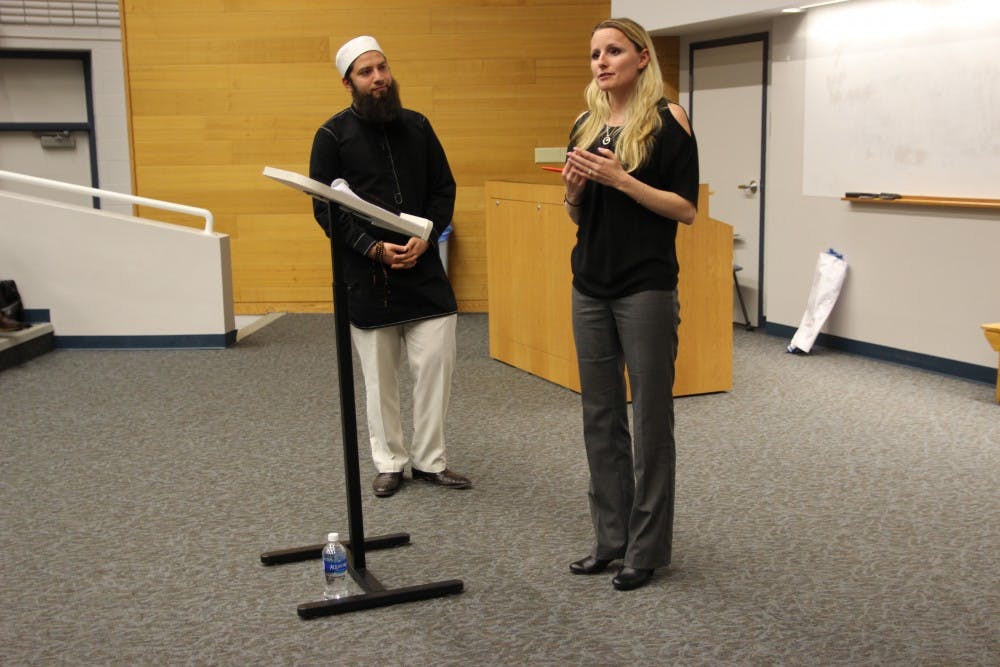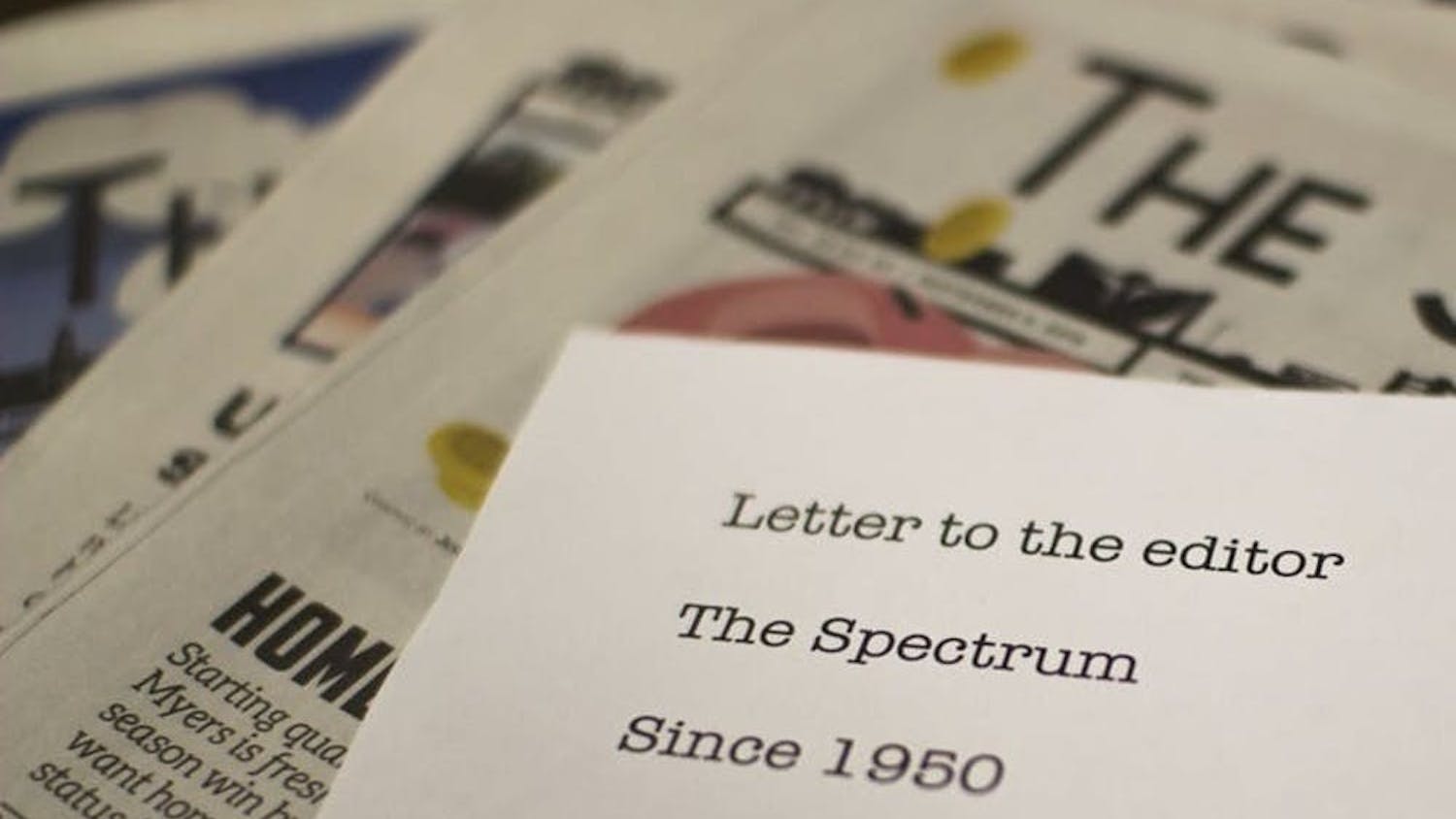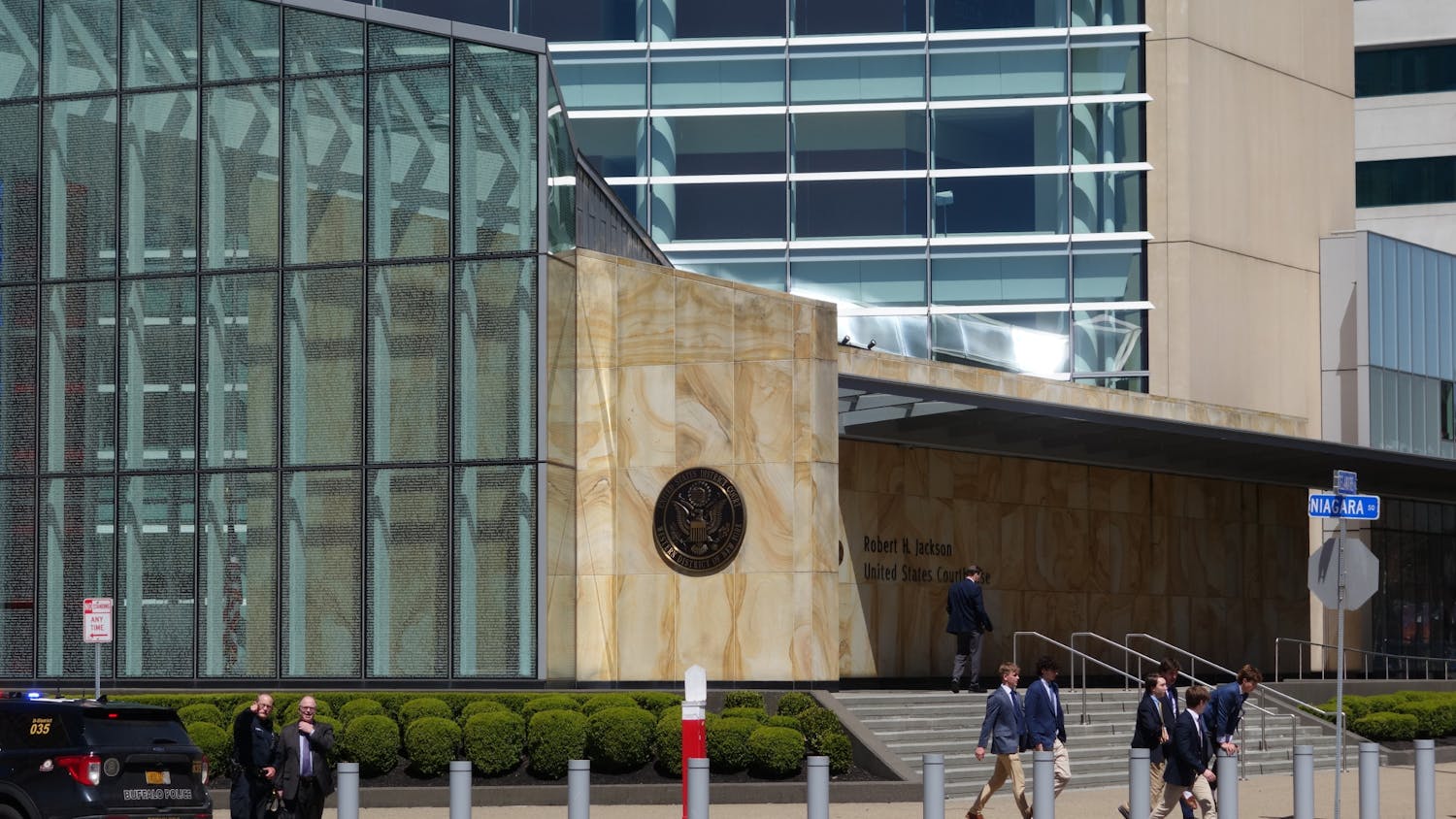Hassan Shibly believes people are more likely to get struck by lightning than be killed by a terrorist who calls himself Muslim.
Shibly, a civil rights lawyer, UB alumnus and director of the Florida chapter of the Council on American-Islamic Relations (CAIR), was one of two panelists for an event entitled “Exposing Radical Islamophobes: Breaking Down the Misinformation of Robert Spencer.” The event was hosted by the Muslim Student Association (MSA) and also featured Dr. Katharina Azim, a professor in UB’s psychology department. Roughly 200 people attended the event, which took place in Norton 112 on Wednesday evening.
Azim and Shibly discussed misconceptions about Islam and addressed points made by Robert Spencer in his Monday speech at UB.
Shibly thinks Islamophobia is manufactured by “hate profiteers” and believes it undermines liberty, freedom of speech and safety.
A hate profiteer is someone who makes money off of hateful rhetoric based on double standards and information taken out of context, Shibly said. He feels Robert Spencer is a hate profiteer. These individuals promote the same lies about Muslims that were made about Jews in Germany 70 years ago, Shibly explained.
“If you compare Nazi quotes about Jews and Spencer’s quotes about Muslims, it is almost verbatim. It’s the same hate with a different target,” Shibly said.
He feels people like Spencer are a threat to democracy and liberty.
“When I hear Spencer say that Islam should be illegal, I hear him saying my religion should be outlawed... and what I hear him saying is that he will chip away at the First Amendment to the United States Constitution,” Shibly said.
Therefore, Shibly concluded, he is not just defending his faith; he is actually defending his country.
“When we start chipping away at certain people’s rights, we start chipping away at the Constitution, and then we all lose our rights – today it’s this group, tomorrow it’s that group,” Shibly said.
He also feels it is a violation of First Amendment rights when government officials and police officers question Muslims about their faith. He feels such questioning undermines Americans’ safety because officials become so focused on profiling Muslims they miss out on actual criminals.
Shibly described a time his family was selected for random questioning at the U.S./Canadian border.
“Random means they saw your headscarf,” Shibly said he remarked to his mother as they were pulled aside into a room of 40 or so people – all of whom were Muslim.
“I swore I was in a mosque,” Shibly said. The group was held “like criminals” for six hours. During that time, a white American man got through the border with no issue, and ended up killing people in Canada.”
Shibly made it clear that Muslims condemn violence.
“Every group, whether it is a political group or a religious group, has people who do crazy things,” Shibly said. “Mainstream, moderate, humane individuals of all different religions and political thought have a lot more in common with each other than people who claim to share their faith.”
Between 1980 and 2005, 7 percent of terrorism was committed by people who claimed to be Jewish, 6 percent was done by people who call themselves Muslim, and “double digits” terror acts were committed by people calling themselves Christian, Shibly said.
Shibly also clarified the definition of Sharia Law, which he said means “path to water.” It is not a specific, monolithic code and is open to debate and interpretation. Sharia aims to protect religion, life, intellect, honor and property, just as the Constitution does, he said. It forbids forcing religious practices and beliefs on non-Muslims.
Praying five times a day and honoring one’s mother is what Sharia looks like for the average Muslim. Dishonoring family is the greatest sin, he said.
He explained that Jihad means “to struggle,” and can mean a struggle with one’s own ego, such as working to become less arrogant, or a struggle to defend the oppressed.
Shibly addressed Spencer’s right to speak at UB.
“Even though I dramatically disagree with inviting Spencer, I think he has a right to speak. I just don’t think he deserves a platform like the University at Buffalo,” Shibly said.
He feels inviting Spencer to UB is no different than inviting a Nazi.
“Just as I wouldn’t invite a Nazi or a member of the KKK, I certainly wouldn’t invite Spencer,” Shibly said.
He feels the line between free speech and hate speech is inciting violence.
“Hateful rhetoric is not cost free and has led to a dramatic increase in hate crimes,” Shibly said.
However, he said he was disappointed that Spencer’s speech was disrupted. He feels it would have been more productive to have a discussion.
“We should not be afraid to let people speak but also challenge them and be driven not by arrogance and a desire to win debates but a desire to unite our community,” Shibly said.
He said the best way to challenge Islamophobia is through service. He said recent efforts by the Muslim community to raise thousands of dollars for the Jewish community after a string of hate crimes against Jewish synagogues cemeteries are an example of this type of service.
Azim addressed the portrayal of Muslims in the media. She said men are portrayed as violent and women are shown as inferior.
“This is essentialized, a caricature and erases reality,” she said. “When we remove the humanity, people are perceived as simplistic, not as whole beings.”
She criticized the fact that Islamophobia is often framed as a political concept and ignores its impact on individuals, particularly in the form of microaggressions, which Azim described as commonplace and daily degradation of minority groups such as Muslims.
Samiha Islam, president of MSA, said she has experienced microaggressions as a Muslim student at UB. She said someone once asked her if it was Halloween because she was wearing a headscarf. In another instance, someone asked how could a man love her if he could not see her face.
Azim said this type of discrimination and degradation causes heightened emotions, which can lead to mental illness, substance abuse and physical illness such as hypertension. However, she said being strong in one’s faith can lessen depression and anxiety.
Tim Weppner, a senior computer science major, attended the event because he wanted to see the “other side” after attending Spencer’s event on Monday. He felt this event did not carry as much weight as Monday’s event if Spencer had been allowed to speak without interruption. He felt the speakers were “good” but he wants to do research and fact-check the points that were made.
Samar Adhami, a graduate student in biology, felt the event was “very necessary” after Spencer’s event.
“A lot of people are not informed because they are so overcome by fear. [The speakers] helped clear up negative connotations,” she said.
Maddy Fowler is the assistant news editor and can be reached at maddy.fowler@ubspectrum.com





